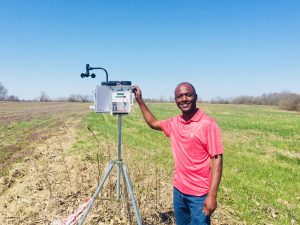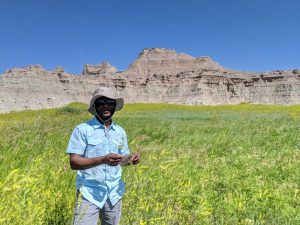While Nasruddeen (Nas) Al-Awwal was less than a year old when his family moved from Missouri back to their home in Nigeria, he always had a desire to come back to the Show-Me State.
Al-Awwal was born at University Hospital in Columbia, Mo., and just a few months later his father finished his degree at Lincoln University (Jefferson City, Mo.) and moved the family back to Nigeria. Al-Awwal knew deep down that he would eventually find his way back to Missouri.
“My heart has always been attached to where I was born,” Al-Awwal said. “I have wanted to come back here since before I graduated from high school.”
Al-Awwal has been back in Missouri since 2015, and is currently working on his PhD in the University of Missouri College of Agriculture, Food and Natural Resources (CAFNR) School of Natural Resources (SNR). He was recently honored as one of three students named George Washington Carver Graduate Fellows, an award that seeks to attract and support under-represented scholars into MS and PhD degree programs in CAFNR.

“I remember going to my wife and showing her the email I received with such great news, telling her that I would be a George Washington Carver Fellow, which is a huge honor,” Al-Awwal said. “I also immediately took a screenshot and sent it to my mom for her to rejoice with me. I have received some awards in the past, but they are not as significant as this one, considering the fact that George Washington Carver was an important figure, a prominent black scientist and an inventor. Incidentally, he was born in the same state in which I was born, so this makes me so happy. His contributions toward agriculture and methods to prevent soil depletion can never go unnoticed.
“I am glad that there is a fellowship in place here in CAFNR for under-represented minorities named after this great man. I believe it will encourage a lot of under-represented students to realize their dreams.”
Al-Awwal returned to Missouri to pursue a career in education, after receiving his bachelor’s degree in applied chemistry from the Usmanu Danfodiyo University in Sokoto, Nigeria, and his master’s degree in organic chemistry (with emphasis in synthesis) from the Sri Ramaswamy Memorial (SRM) Institute of Science and Technology in Kattankulathur, Chennai, India.
Al-Awwal spent six years as an instructor in Nigeria before beginning his master’s work in India. He taught advanced-level chemistry at the Kano State College of Art, Science and Remedial Studies in Kano, Nigeria. It was that experience that has pushed Al-Awwal to pursue a master’s degree and a doctoral degree.
“Back in Nigeria, at the time I graduated from high school, my ambition was to become a medical doctor, but there were challenges outside my control in being able to pursue this career even though I was qualified to enter the program,” Al-Awwal said. “So, from that time, I took it upon myself that I will become a teacher, and I encouraged a lot of students to realize their dreams of becoming doctors, engineers and other professions. I am always proud of what I did. My students have graduated from several fields and are practicing their careers, and I am happy for them. I am still in contact with many of them.
“I am extremely interested in educating young people about environmental sciences and the importance of this field for the future of the planet. I love teaching and hope to teach others about the exciting field of environmental science. My long-term career goal is to teach at the university level and conduct research.”
When Al-Awwal first returned to Missouri in 2015, he was actually focused on finding a teaching job at Lincoln University.
“My dad graduated from Lincoln University, and I know Lincoln is one of the historically black land-grant universities and it has ethnic diversity,” Al-Awwal said. “So, when I came back to the United States, at first, I searched for a teaching job at Lincoln University, but that didn’t work out as expected. One of my acquaintances said, ‘Nas, it will be hard for you to get hired with a foreign degree at this level. I suggest you get another degree; you can apply to Lincoln University and I know they can give you an assistantship.’ So, I applied and got accepted into the MS in Environmental Science program with anticipation that after I graduated, I would join the University of Missouri, as there is no PhD program at Lincoln University.
“Lincoln University has a Memorandum of Understanding for programs with the University of Missouri. My advisor at that time said I may go for my PhD at the University of Missouri; he would be able to support me and that he has many projects that we can work on.”

Al-Awwal’s advisor while he was at Lincoln University was Majed El-Dweik, Dean of the College of Agriculture, Environmental and Human Sciences. Al-Awwal’s advisor at MU is Stephen Anderson, William A. Albrecht Distinguished Professor of Soil and Environmental Sciences.
Al-Awwal’s current research focuses on investigating transport of fluorescence labeled E. coli in agroforestry buffer and row crop soils. He is also developing a nano-biosensor that can rapidly detect E. coli O157:H7 in water and food samples. E. coli O157:H7 is a pathogen that causes disease from consumption of contaminated food and water. Al-Awwal’s interests include evaluating selected conservation management systems and how they can be used to mitigate the effect of E. coli transport in soil and their effects on water quality.
“While pursuing my graduate work in environmental science at Lincoln University, I became increasingly interested in the issue of nutrient pollution in water resources,” Al-Awwal said. “I have been involved in helping design a handheld instrument to be used in the detection of nutrient pollutants in water. I hoped to pursue this interest further in my graduate work at the University of Missouri in order to mitigate the challenges of nutrients being discharged into rivers and streams, posing potential risks to animal and human health. Restrictions on the grant provided to me from Lincoln University encouraged me to tailor my interests to align with the objective of working with waterborne pathogens. Thus, I am evaluating the fate and transport of pathogens in soils affected by conservation management with assistance from my academic advisor, Dr. Stephen Anderson.”
Al-Awwal has expanded his teaching experience while at Mizzou, serving as a guest lecturer for a handful of classes and mentoring both undergraduate and graduate students. Being available as an instructor is an important part of who Al-Awwal wants to be as a future professor.
“In the United States, the teaching and learning processes are different from both Nigeria and India, as we have more resources to enhance education here, ranging from PowerPoint presentations, laboratory instruments which students can use to obtain more hands-on experience, field laboratory experiences, and more. The teachers are always there to assist and work with students individually, especially here at the University of Missouri, which is something I really appreciate.”